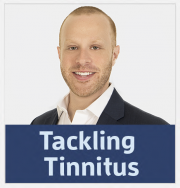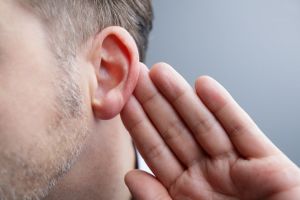|
www.HealthyHearing.com |
Facing the fear of hearing loss due to Meniere’s diseaseLiving with this rare condition means the constant threat of losing your hearing
Contributed by Glenn Schweitzer When I was diagnosed with bilateral Meniere’s disease in 2011, I was 100% convinced that I was slowly going deaf in both ears. 
My initial audiogram showed low-mid frequency hearing loss typical to Meniere’s disease, and my first doctor explained that it was only going to get worse. It wasn’t until I found a better specialist that I learned this might not be the case. Fast forward to today, and I now know the second specialist was right, at least so far. I also know how incredibly lucky I am to have any hearing left at all. Some Meniere’s sufferers are not so fortunate. But a series of recent events have once again forced me to confront the very real possibility of hearing loss in a way that I can no longer ignore. Hearing loss runs in my familyHearing loss has affected my family in ways that no one ever wanted to face or admit. Several members of my extended family have lived with varying degrees of untreated hearing loss for many years now. It didn’t matter how much we pushed and prodded them to explore the possibility of hearing aids. They wouldn’t even entertain the idea. The stigma is very real. But after years of denial and arguments, they all finally purchased hearing aids! In some ways, it feels like a victory. Hearing loss affected their quality of life in ways that were all too obvious to us, but not at all to them. But it also brings me face to face with one of my deepest fears–a truth I push away at every turn– that because of Meniere’s disease, my hearing is more at risk than all of my family members combined. I haven’t really had a reason to think deeply about the possibility of my own hearing loss in a long time. But this reopened the door in my mind and made what happened next all the more terrifying. Facing the fear early onIt will be helpful to give you a little bit of context at this point in the story. 
it can be painful and disorienting. My experience with my first ENT was not a good one. In the early days of my diagnosis, he had me convinced that it was only a matter of time before I went deaf. I was having frequent vertigo episodes, increasing fullness and pressure in my ears, constant dizziness and brain fog, and my tinnitus was getting worse. The prospect of losing my hearing and still having to live with the horrible high-pitched ringing absolutely terrified me. Luckily, I found a better specialist fairly quickly. This doctor was a neurotologist—an ENT who further specialized in treating neurological conditions of the inner ear—and had far more experience diagnosing and treating Meniere’s disease, as well as other hearing and balance disorders. When I expressed my fear of further hearing loss, he explained that if I could get a handle on my symptoms, there was no reason that I should expect to go deaf. He said it was the Meniere’s episodes—the violent vertigo attacks—that caused the most damage to my hearing. If I could get them under control, I would likely preserve my hearing. And he’s been right, at least so far. It’s eight years later and my hearing is still good, though I haven’t had it tested in a while to know for sure. In any case, I’m know I’m not out of the woods. My hearing will always be at significant risk. But then again, life offers no guarantee on hearing for anyone. We are all at risk to some degree. It’s just that this vulnerability is becoming more and more apparent in my day-to-day life. Denial can be usefulIn some ways, my denial has served me over the years. I would never want to just be worried about my hearing all the time. Of course, I wear earplugs when in loud environments and I make an effort to keep the volume down on my headphones. But I’m not always as careful as I should be, and that’s a hard thing to admit as someone who writes about managing hearing and balance conditions. The problem is that loud noise isn’t the only variable I need to consider. Anything that triggers my Meniere’s symptoms can ultimately lead to hearing loss. And there are times when I let go of my discipline entirely in terms of what I need to do on an ongoing basis to protect the fragile balance of wellbeing I’ve found with Meniere’s disease. For these transgressions, I’ve paid the price, over and over again, especially during the past year. 'Absolutely terrifying' bout of hearing lossA few years ago, I had a new baby at home and a wife undergoing breast cancer treatment. My stress levels were through the roof, and my coping strategies were not always the healthiest. For example, I wasn’t sleeping well, and my anxiety was ramping up big time. In hindsight, I should have doubled down on my lifestyle management efforts. Instead, I ate terribly–using comfort junk food as a crutch–stopped exercising, and put most of my healthy coping tools aside. At first, I was managing to keep it together. But one night, after mindlessly eating several servings of chicken pot pie loaded with sodium (a fact I chose to ignore), I suddenly experienced a loss of about 50% of my hearing in my left ear. It was undeniable, and absolutely terrifying. Over the years, during Meniere’s flare ups, I’ve experienced my share of temporary hearing loss. Especially during periods of fullness and pressure in my ears, which sometimes affects my hearing quite significantly for a short while.
But this was different. It was like a switch flipped and half of my hearing was gone. As the minutes turned to hours, I started panicking. It wasn’t getting any better. I tried to stay calm. I knew that the anxiety was making it worse. I meditated and practiced several breathing techniques, but nothing changed. My hearing got better, but I was rattled
bouts of hearing loss. Later that night, when I finally went to bed, my hearing had improved only slightly. It’s entirely possible that it didn’t actually improve at all and I was just getting acclimated to the change. Either way, it gave me a glimmer of hope. When I woke up in the morning, it was noticeably better, and continued to improve over the course of the day. By the next morning, my hearing was back to normal. But it rattled me in a way that I haven’t experienced in a very long time and forced me to confront my fear head on. I’m vulnerable in ways most people don’t have to think about, and I have to protect the hearing I have left at all costs. The whole experience was a sobering reminder of what’s truly at stake when I stop making an effort for my health. Accepting that life happensDespite this experience and others like it, I still sometimes take my hearing for granted for reasons I can’t explain. It baffles me, because I have a deep love and connection to music and other forms of audio. I’m obsessed with podcasts and have listened to thousands of hours of content over the years. I feel soothed by nature sounds and enjoy relaxing soundscapes of all shapes and sizes. And it can all be taken from me in an instant. I’ve experienced it firsthand, and lately, it keeps me up at night. Moving forward, I’m doing my best to learn from these experiences and trying not to make the same mistakes twice. But I’m not perfect, and life happens. I know I will be exposed to loud sounds I can’t avoid and stress I can’t control. So I’m also making an effort to learn more about hearing loss and available treatments, including hearing aids, cochlear implants, assistive listening devices, and other hearing technology. More: Apps for tinnitus Hearing loss is treatableAt the end of the day, the truth is that even in worst-case scenario–if I were to lose my hearing partially or entirely–there is hope. Because hearing loss, even total hearing loss, can usually be restored (to some degree) through a variety of hearing technologies and medical devices. It’s not a perfect solution, but a solution nonetheless, and the technology is getting better every day. It’s also likely that we will be able to cure hearing loss entirely in the near future. Many innovative biotech companies are working hard on promising new treatments as we speak. So if you are struggling with hearing loss, and you haven’t explored hearing aids, cochlear implants, or other hearing loss treatments, I highly recommend making an appointment with a hearing specialist today. And if you are simply afraid to lose your hearing, like I am, know that there is hope! And you’re not alone, even in your fear. Tackling Tinnitus: Read more of Glenn Schweitzer's columns Glenn Schweitzer
Related Help Pages:
Hearing loss Symptoms Tinnitus (ringing in the ears) Meniere's disease Dizziness
|
Featured clinics near me
Earzlink Hearing Care - Reynoldsburg
7668 Slate Ridge Blvd
Reynoldsburg, OH 43068

Find a clinic
Need a hearing test but not sure which clinic to choose?
Call 1-877-872-7165 for help setting up a hearing test appointment.


 Glenn Schweitzer is an entrepreneur, blogger, and the author of Rewiring Tinnitus and Mind over Meniere’s. He is passionate about helping others who suffer from tinnitus and vestibular disorders and volunteers as an Ambassador Board Member for the Vestibular Disorders Association (VEDA). Through his blogs, he continues to raise awareness for tinnitus, Meniere’s disease, and other vestibular disorders, spreading his message of hope to those in need.
Glenn Schweitzer is an entrepreneur, blogger, and the author of Rewiring Tinnitus and Mind over Meniere’s. He is passionate about helping others who suffer from tinnitus and vestibular disorders and volunteers as an Ambassador Board Member for the Vestibular Disorders Association (VEDA). Through his blogs, he continues to raise awareness for tinnitus, Meniere’s disease, and other vestibular disorders, spreading his message of hope to those in need.